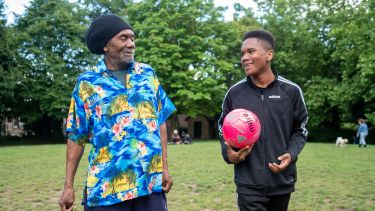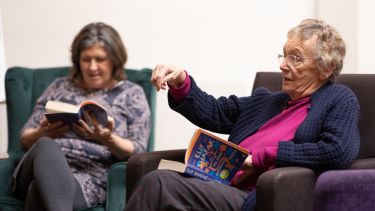Daniel Clark - They were the future once: oppression in the lives of older people

About my PhD
In her work on justice and difference, the political theorist Iris Marion Young identifies older people as an oppressed social group. My PhD research takes this claim seriously. Taking Young’s five faces of oppression as a starting point, my PhD moves from considering representations of older people to considering how an analysis of anti-ageing products reveals the way in which the portrayal of older people is inextricably linked to capital’s need to reproduce. From there, I consider unpaid care and, finally, the institution of the care home.
My PhD also adjusts the scaffolding on which the analysis rests. Whilst I do think that Young’s contribution to political theory is incredibly important, I see some room for development in certain elements of her thought. For example I do not think her account of a social group is applicable to older people, and nor do I agree with the fact Young grants equal weight to each face of oppression. In my view, cultural imperialism is foundational for the functioning of other forms of oppression. My PhD, therefore, is about both older people and the thought of Iris Marion Young.
Why I'm interested in this topic
The path to this topic probably inevitable. From the second year of my undergraduate degree, I worked as a carer in a variety of settings (though mostly supporting older people). I worked throughout the Covid-19 pandemic, during which a couple of things became clear. First, as is well documented, the government did not give adequate attention to the needs of care homes. Second, as lockdown restrictions were lifted, people living in care homes still lived in conditions as if those restrictions were still in place. After a shift at work, I could meet with my family and friends, whilst the people I cared for could only see their loved ones behind a Perspex screen. This struck me then, and still does now, as an injustice.
At the same time, I was continuing with my studies, and I couldn’t help but notice that political theorists just weren’t really talking much about older people. My Master’s thesis considered the role of hermeneutical injustice in the lives of people living with dementia, which is another group not often considered in political theory. However, I wanted to develop a theory that looked specifically at the situation of older people. Fast forward a couple of years, and I’m trying to do just that.
What's new about my research
I hope to make two contributions with this research. First, it’ll correct political theory’s long-standing neglect of considering older people as older people. For the most part, political theorists have only considered older people in the context of intergenerational injustice and resource distribution. Whilst these areas are important, they don’t engage with the social position of older people in the way that my research aims to do.
Second, this work will contribute a new engagement with the early work of Iris Marion Young. A lot of secondary literature on Young’s work doesn’t really engage with her earlier work, with most of the discussion being centred on her later work concerning global justice. What’s also missed is that Young actually has quite a lot to say about older people, and my research shines a light on that in a way that hasn’t been done in any sustained way.
What impact my research could have
I hope my research shifts political theory’s focus away from just intergenerational justice and contributes a deeper understanding about the social reality of older people. There’s a fairly common view that older people ‘have it all’, and I hope my research can bring attention to the fact that isn’t necessarily the case. We actually live in a world suffused with ageist ideas and stereotypes. I hope this research can shine a light into those dark corners so that they start being talked about in a rigorous way.
What's most interesting about this work
For me, the most interesting thing about my work is the truly interdisciplinary nature of it. I’m not only working in the field of political theory, but also sociology, social gerontology, and I even engage with some medical literature. I’m working across the boundaries of different disciplines, which just goes to show how permeable those boundaries can be. Not only that, my work travels throughout the discipline itself, and I place Young into conversation with Hannah Arendt, some members of the Frankfurt School, and the Open Marxist school. It’s interesting to see how tracing a concept across different thinkers and schools allows you to see connections that aren’t immediately obvious.

